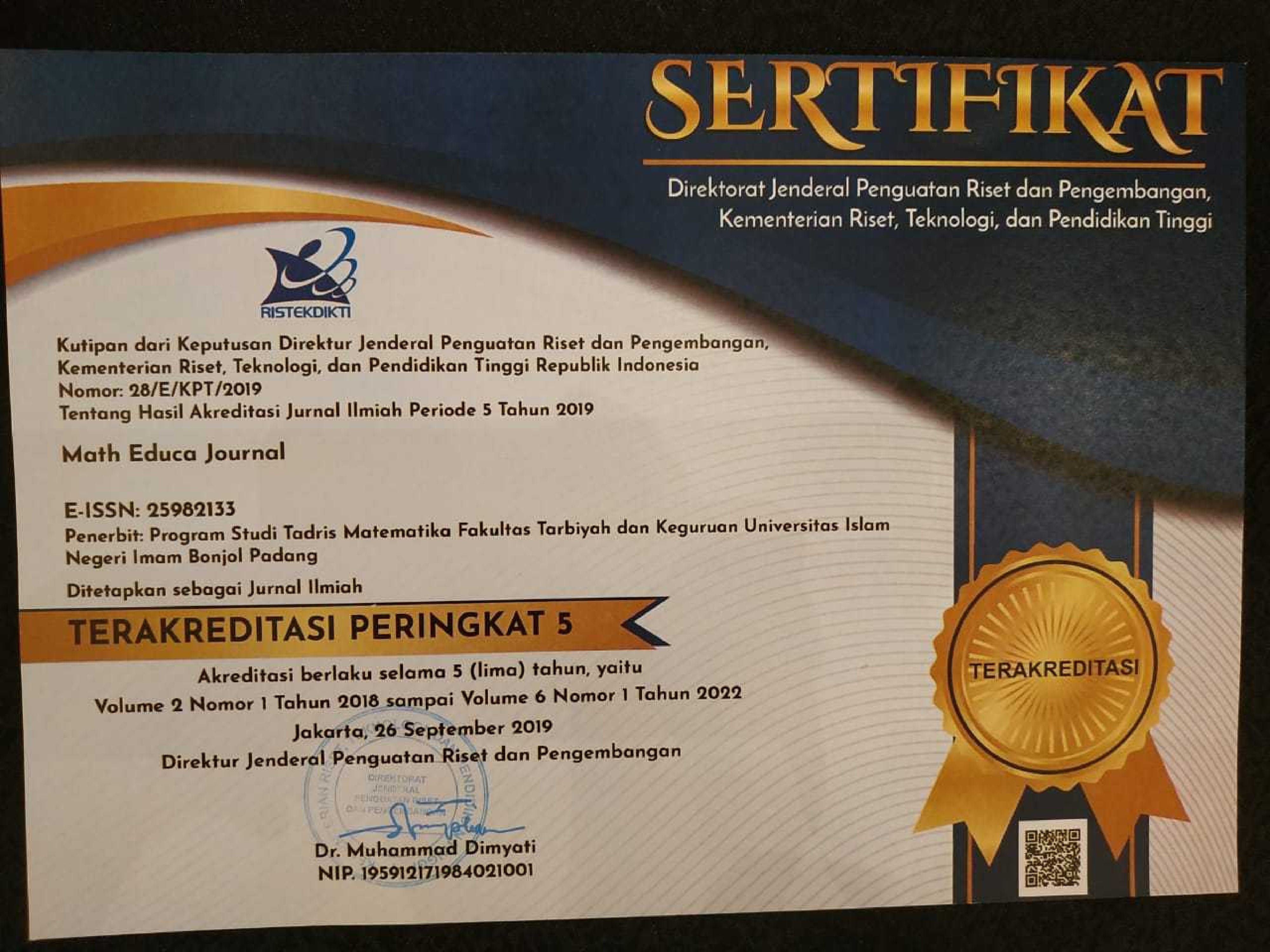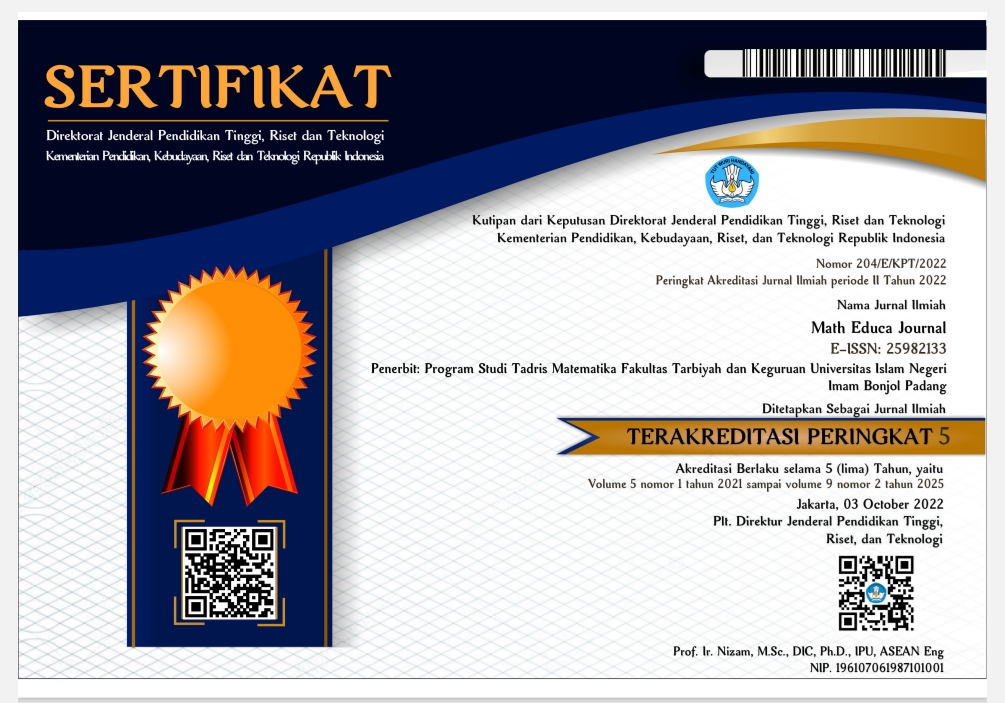Penerapan Strategi Pembelajaran Aktif Tipe Inquiring Mind Want to Know untuk Meningkatkan Pemahaman Konsep dan Pemecahan Masalah Matematis
Abstract
The purpose of this study was to determine that the conceptual understanding of math and problem solving skill of students taught using the application of active learning strategies types Inquiring Mind Want to Know better than the conceptual understanding of math students taught using conventional strategy. This research is a quasi-experimental research with the design of randomized control group only design. The populations in this study were five classes of students of grade VII SMPN 35 Padang (165 students). The choice of class random sampling (random data retrieval). Classes are chosen as experimental class is a class VII.4 and control class is the class VII.5. Data were taken from the results of final test is a test essay from each class. Based on the data analysis of research obtained that the understanding of math concepts and problem solving experimental class students is higher than the control class. This is evident from the average value of the test understanding of concepts and mathematical problem solving experimental class students is 76,45 while the average grade control is 63,27. Hypothesis testing using t-test, obtained tcalculate > ttable (1,72 > 1,65) with a 95% confidence level, the hypothesis is accepted. So it can be concluded that the understanding of math concepts and problem solving students who apply active learning strategies types “Inquiring Mind Want to Know” better than on understanding math concepts and problem solving students using conventional teaching in class VII SMPN 35 Padang.
Keywords: Active learning strategies types Inquiring Mind Want to Know, understanding math concepts, and problem solving
Full Text:
PDFReferences
Al-Qur’an dan terjemahannya, 2005. Jakarta: CV. Jumanatul ‘Ali-ART.
Arikunto, Suharismi. 2006. Dasar-dasar Evaluasi Pendidikan. Yogyakarta: Bumi Aksara.
Arikunto. 1997. Evaluasi Pendidikan. Yogyakarta: Bumi Aksara.
Isjoni. 2010. Pembelajaran Kooperatif. Yogyakarta: Pustaka Belajar
Jihad, Asep dan Abdul Haris. 2012. Evaluasi Pembelajaran. Yogyakarta: Multi Persindo, Cet III.
Lie, Anita. 2002. Cooperative Learning. Jakarta: Grasindo
Nasution, M. 2001. Berbagai Pendekatan dalam Proses Belajar Mengajar. Jakarta: Bumi Aksara.
Prawironegoro, Pratikyo.1985. Evaluasi Belajar Khusus Anlisis Soal untuk Bidang Studi Matematika. Jakarta: PPLPTK
Saefuddin, Asis dan Ika Berdiati. 2014. Proses Belajar Mengajar. Jakarta: Kecana.
Sanjaya, Wina. 2005. Pembelajaran dalam Implemntasi Kurikulum Berbasis Kompetensi. Jakarta: kencana.
Shihab, M. Quraish. 2005. Tafsir Al-Misbah. Jakarta: Lentera Hati
Silberman, Melum. 2006. Active Larning 101 cara belajar Siswa aktif. Bandung: Nusa Media.
Silberman, Melum. 2007. Active Larning (Belajar Aktif). Bandung: Nusa Media.
Sudjana. 2002. Metoda Statistika. Bandung: Tarsito.
Sudjana, Nana. 1989. Dasar-dasar Proses Belajar Mengajar. Bandung: Sinar Baru Algensindo.
Suharismi, Arikunto. 2008. Dasar-dasar Evaluasi Pendidikan. Rev.ed. Jakarta: Bumi Aksara.
Suherman, Erman dkk. 2003. Strategi Pembelajaran Matematika Kontemporer Bandung: Jurusan FMIPA UPI.
Sumantri.2001. Proses Pembelajaran. Jakarta: Rineka Cipta.
Suryabrata. 2010. Metodologi Penelitian. Jakarta: PT. Raja GrafindoPersada.
Refbacks
- There are currently no refbacks.
The Journal Space of the Mathematics Education Department
Faculty of Education and Teacher Training
State Islamic University of Imam Bonjol Padang
Email: mej.uinibpadang@gmail.com

Math Educa Journal is licensed under a Lisensi Creative Commons Atribusi-NonKomersial 4.0 Internasional.
Based on a work at https://ejournal.uinib.ac.id/jurnal/index.php/matheduca.
All rights reserved p-ISSN: 2580-6726 | e-ISSN: 2598-2133




